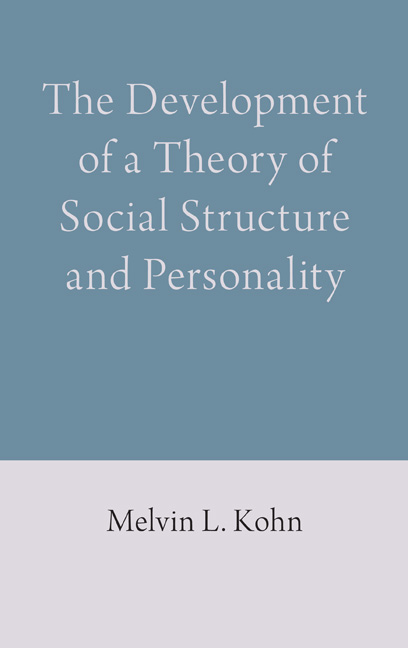Book contents
- Frontmatter
- Contents
- Preface
- 1 Hagerstown and Schizophrenia
- 2 Social Stratification and Parent–Child Relations in Washington, DC
- 3 The Torino Study
- 4 Men Employed in Civilian Occupations in the United States
- 5 The Transformation of the Occupations Study into a Longitudinal Analysis
- 6 Life on Sabbatical Leave in Norway and at the National Institute of Mental Health
- 7 Class, Stratification, and Personality
- 8 Poland under Communism
- 9 Occupational Self-Direction and Distress in Poland
- 10 The Vietnam War, Nixon, and Me
- 11 Japan
- 12 Germany – West and East
- 13 Poland and Ukraine in Transition to Capitalism and Democracy
- 14 The Presidency of the American Sociological Association, Ronald Reagan, and My Job Switch
- 15 My Two Exploratory Expeditions to China
- 16 China in Transition to a Modern Economy
- 17 Retirement, and My Last Sabbatical, at Deep Springs Junior College
- 18 The Theory I Propose
- Index
5 - The Transformation of the Occupations Study into a Longitudinal Analysis
Published online by Cambridge University Press: 12 July 2019
- Frontmatter
- Contents
- Preface
- 1 Hagerstown and Schizophrenia
- 2 Social Stratification and Parent–Child Relations in Washington, DC
- 3 The Torino Study
- 4 Men Employed in Civilian Occupations in the United States
- 5 The Transformation of the Occupations Study into a Longitudinal Analysis
- 6 Life on Sabbatical Leave in Norway and at the National Institute of Mental Health
- 7 Class, Stratification, and Personality
- 8 Poland under Communism
- 9 Occupational Self-Direction and Distress in Poland
- 10 The Vietnam War, Nixon, and Me
- 11 Japan
- 12 Germany – West and East
- 13 Poland and Ukraine in Transition to Capitalism and Democracy
- 14 The Presidency of the American Sociological Association, Ronald Reagan, and My Job Switch
- 15 My Two Exploratory Expeditions to China
- 16 China in Transition to a Modern Economy
- 17 Retirement, and My Last Sabbatical, at Deep Springs Junior College
- 18 The Theory I Propose
- Index
Summary
Carmi Schooler's and my decision to do a follow-up of the occupations study of social stratification and personality resulted in a remarkable transformation of the research, as we knew it would, but we had little advance knowledge of what that transformation would entail. For one thing, it became a much more intensive study, for we were not merely selecting a new sample, but searching for, and trying to interview, the very same men we had interviewed years before, wherever in the United States they might now be living. That was not easy to do. Moreover, when they had initially been interviewed, many of them had thanked us for a very interesting experience. Ten years later, all they remembered was that it had taken (on the average) two and a half hours. Not only that, but we were trying also to interview their wives, if they were now married, and the child about whom we had inquired earlier, wherever that child might now be living. This was during the Vietnam War and funds were scarce, but our bosses, John Eberhart and Bob Cohen, were enthusiastic about the study, and they somehow secured the funds for us. Even the officials of the Nixon administration, whatever they thought of me and my politics, seemed supportive.
More important still, a revolution in statistical analysis was in process, as Karl G. Joreskog and his colleagues were inventing linear structural equations analysis, a brand-new form of analysis that permitted us to go far beyond the correlations between job conditions and personality, to assess the mutual effects of social structure on personality and of personality on position in the social structure that produced their combined effects. Carmi and I were very much aware of this in-process revolution and we tried to keep up with it; we even went back to school to update our knowledge of statistics – a major undertaking. And, ever eager to improve our research, we also had plans for adding to what we wanted to ask our respondents. But luck was again on our side. It worked out that we could do what needed to be done before the fieldwork was started, then we again turned the fieldwork over to the expert hands of the National Opinion Research Center, who carried it out in exemplary fashion.
- Type
- Chapter
- Information
- Publisher: Anthem PressPrint publication year: 2019



